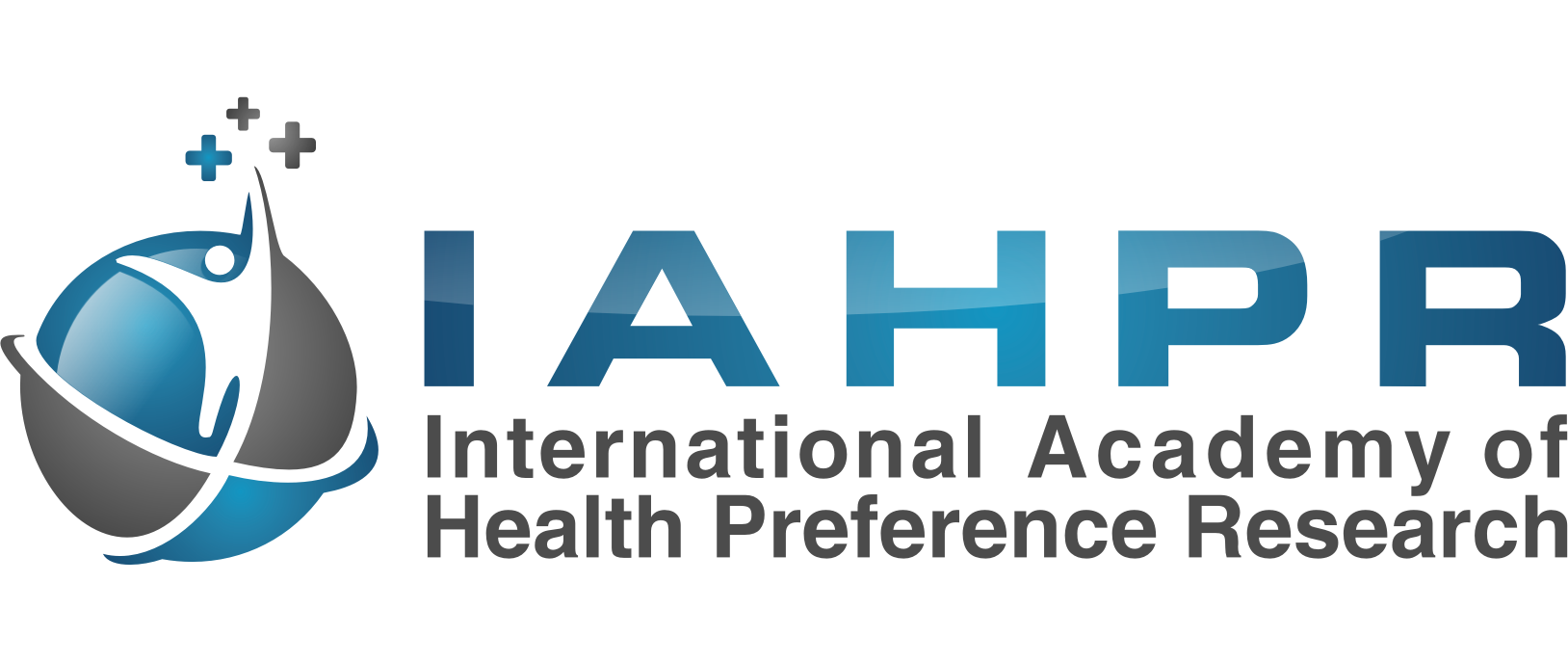
We are excited about our 16th IAHPR Annual Meeting! The meeting will take place at the University of Twente in Enschede, Netherlands, from September 29 to October 1, 2025.
We will bring together researchers, scholars, and practitioners from around the world to discuss the latest advancements in health preference research. We invite you to submit your abstracts and be part of this important event!
This year’s meeting theme will be Artificial Intelligence and Health Preference Research, and we especially encourage submissions related to this topic. However, we also welcome abstracts on all areas of health preference research, as we aim to foster a diverse discussion. We look forward to your contributions!
Stay tuned for more details on registration, program highlights, and keynote speakers. We look forward to your participation and contributions to make this meeting a great success.
- Location: University of Twente, Enschede, Netherlands
- Dates: September 29 – October 1, 2025
REGISTER HERE!
Registration fees
The fee schedule below excludes processing fees and any taxes required with the purchase of the registration. Please note all costs are quoted in US dollars.

Pre-Meeting Workshop: Artificial Intelligence and Health Preference Research
September 29, 2025 | TechMed Centre | Enschede, Netherlands
We are excited to announce this year’s pre-meeting workshop, aligned with our 2025 theme: “Artificial Intelligence and Health Preference Research.” This interactive session will explore the integration of machine learning and large-language models into health-preference assessments. Attendees can register in advance to participate.
We are honored to welcome two distinguished speakers:

Dr. Sander van Cranenburgh
Associate Professor of Choice Modelling, TU Delft
Dr. van Cranenburgh’s research focuses on developing innovative models to better understand human choice behavior, particularly through the use of unstructured data such as images and text. He leads the CityAI Lab at TU Delft, which applies machine learning to study the evolution of residential segregation, uncover urban perceptions, and develop smart noise sensors for detecting sources of urban noise pollution.

Prof. Dr. Paul Groth
Professor of Algorithmic Data Science, University of Amsterdam
Dr. Groth leads the Intelligent Data Engineering Lab (INDElab.org) and has spearheaded several large-scale biomedical data integration and knowledge graph construction initiatives. He previously co-chaired the W3C Provenance Working Group and continues to conduct research on data provenance and integration. He is also the founding scientific director of the University of Amsterdam’s Data Science Centre, which supports the use of data science methods across disciplines. In addition, Dr. Groth co-directs two Innovation Center for Artificial Intelligence labs—AIRLab, focused on retail AI in collaboration with Ahold Delhaize, and the Discovery Lab, which partners with Elsevier to advance scientific discovery.
Join us for this engaging workshop at the intersection of AI and preference science!
FOR MORE INFORMATION ABOUT THE MEETING CLICK HERE.
Past Meetings
15th Meeting of the International Academy of Health Preference Research
September 29 – October 1 June 2024, chaired and hosted by Deborah Marshall, Carina Oedingen,
Karen MacDonald, and Norah Crossnohere
Banff, Alberta, Canada
14th Meeting of the International Academy of Health Preference Research
21-22 June 2023, chaired by Gang Chen and Julie Ratcliffe,
and hosted by Richard Norman and Yuanyuan Gu
Sydney, New South Wales, Australia
13th Meeting of the International Academy of Health Preference Research
5-6 September 2022, chaired by Michał Jakubczyk and Jorien Veldwijk,
and co-hosted by Esther W. de Bekker-Grob and Axel C. Mühlbacher.
Berlin, Germany
12th Meeting of the International Academy of Health Preference Research
23-24 June 2021, chaired by Ateesha Mohamed and Shelby Reed,
and hosted by Derek S. Brown and Benjamin M. Craig.
Zoom Webinar, Durham, North Carolina, USA
11th Meeting of the International Academy of Health Preference Research
2-3 December 2019, chaired by Richard De Abreu Lourenço and Elisabeth Huynh,
and hosted by Emily Lancsar.
Symposium: Giving a voice to marginalised groups for health care reform
Workshop: Good Practices in Health Preference Research, Benjamin M. Craig
Auckland, New Zealand (photos)
10th Meeting of the International Academy of Health Preference Research
13-14 July 2019, chaired by Esther W. de Bekker-Grob and Jennifer A. Whitty,
and hosted by Axel C. Mühlbacher.
Symposium: Patient Preferences in the Medical Product Lifecycle
Workshop: Good Practices in Health Preference Research, Axel C. Mühlbacher
Basel, Switzerland (photos)
9th Meeting of the International Academy of Health Preference Research
13-14 October 2018, chaired by Meenakshi Bewtra and Jan Ostermann.
Symposium: Support tools for Preference-sensitive decisions
Montréal, Québec, Canada (photos)
8th Meeting of the International Academy of Health Preference Research
27-28 September 2018, chaired by Brendan Mulhern and Richard Norman.
Symposium: Design of Discrete Choice Experiments
Hobart, Australia (photos)
7th Meeting of the International Academy of Health Preference Research
3-4 November 2017, chaired by Karin Groothuis-Oudshoorn and Terry Flynn.
Symposium: Econometrics of Preference Heterogeneity
Glasgow, UK (photos)
6th Meeting of the International Academy of Health Preference Research
6-7 July 2017, chaired by Juan Marcos González Sepulveda and F. Reed Johnson
Symposium: Preference Evidence for Regulatory Decisions
Boston, USA (photos)
5th Meeting of the International Academy of Health Preference Research
2 September 2016, chaired by Kirsten Howard and Mark Oppe
Singapore (photos)
4th Meeting of the International Academy of Health Preference Research
Workshop: Lessons learned from recent studies in health valuation
12-13 July 2016, chaired by Mandy Ryan and Elly Stolk
Hamburg, Germany (photos)
3rd Meeting of the International Academy of Health Preference Research
17–18 October 2015, chaired by Derek S. Brown
St Louis, USA (photos)
2nd Meeting of the International Academy of Health Preference Research
29 September 2015, chaired by Emily Lancsar
Brisbane, Australia (photos)
1st Meeting of the International Academy of Health Preference Research
8 November 2014, chaired by Axel C. Mühlbacher
Amsterdam, The Netherlands (photos)
Frequently Asked Questions
Q: How are IAHPR abstracts rated?
A: At the start of the review process, the names of the authors are removed from the abstracts to allow for blinded review. Next, the meeting co-chairs assess whether each abstract meets the minimum criteria for review and request that all tenured members of the Academy review and rate each candidate abstract along a structured form (Superior, Good, Acceptable, Unacceptable). If members have conflicts of interest (e.g., co-authorship) or the abstract is beyond their subject matter capabilities, those members will use a rating of Abstention. Regardless, tenured members are asked to provide clear, written justification for their ratings on all candidate abstracts.
Q: How are the IAHPR abstracts selected?
A: Overall, the selection process is designed to be uniform, transparent, and member-driven. For each candidate abstract, reviewer ratings and comments are summarized and all identifiers are removed. The mean scoring (5*Superior+3*Good+2*Acceptable-5*Unacceptable) is applied uniformly, inherently ranking the candidate abstracts. Using this ranking, the top abstracts are invited for podium presentations. If the meeting has a poster session, the remaining abstracts with acceptable scores (mean score greater than two) are invited for poster presentation. Alternates to the podiums are promoted if needed. Abstract presentations are arranged by co-chairs.
Q: Do submitters and reviewers receive summary scores and comments?
A: Yes, both submitters and reviewers (i.e., tenured members) receive summary scores and comments regardless of abstract acceptance or rejection. However, abstracts that do not pass the administrative review (i.e., rejected by co-chairs) will have no scores and limited comments.
Q: Can I present multiple abstracts at the same IAHPR meeting?
A: Generally no, each presenter is given a maximum of 1 podium presentation per meeting. However, this rule may be relaxed for students, who might have a podium and a poster presentation at the same meeting. If a presenter has multiple abstracts deemed acceptable for a meeting, the presenter must either (1) decline all but 1 podium presentation or (2) make arrangements for a co-author to present the abstract.
Q: Can I present the same abstract at multiple IAHPR meetings?
A: Generally no, the same abstract may not be presented as a podium presentation at multiple IAHPR meetings. However, this rule may be relaxed for students, who might present their abstract as a poster at one meeting and as a podium at the next meeting, which might be particularly useful to showcase preliminary and final work.
Q: Can more than 1 person present the same abstract at an IAHPR meeting?
A: No, only one person per abstract is the presenter and will receive credit for participation in the meeting. Co-authors and non-presenters are welcome to register and attend the meeting, but attendance does not imply participation, which is the basis for IAHPR membership.
Q: What is the difference between symposium, podium, and poster presentations?
A: Poster and podium presentations are selected based on the abstract ratings of the tenured faculty. Symposium presentations are selected by the co-chairs and approved by the Board and tenured faculty. If accepted, each presentation has different requirements. For example, symposium presenters typically participate in panel discussions. Poster presenters may give a brief oral presentation (i.e., elevator talk) as well as respond to questions during the poster session. Unlike poster presentations, symposium and podium presentations count toward tenured membership.
